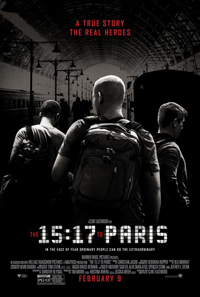Terror Train: Eastwood Monotonously Mulls an Act of Heroism in Failed Experiment
 For evidence of why narrative filmmaking is generally assisted by the designation of actors who have learned at least some facets of their craft, look no further than Clint Eastwood’s egregiously inauthentic experiment, The 15:17 to Paris, which restages the apprehending of a terrorist on a Paris-bound fast train from Amsterdam in 2016 by three brave American civilians, each playing a simulation of themselves. While the idea may seem novel, this isn’t exactly the first time Eastwood has cast a real life person to play themselves (for a successful example of this, check out Lady Chablis as the one saving grace in 1997’s Midnight in the Garden of Good and Evil), and it’s a device which deflates his latest, hobbled irreparably from its opening sequence onward. Penned by first-time screenwriter Dorothy Blyskal, who is adapting from the memoir written by the three men with Jeffrey E. Stern, endless clunky exposition introduces us to three participants as school mates at a 2005 Christian elementary school, taking us all the way to the fateful day in 2016 when they heroically defused a situation which could have potentially claimed the lives of many.
For evidence of why narrative filmmaking is generally assisted by the designation of actors who have learned at least some facets of their craft, look no further than Clint Eastwood’s egregiously inauthentic experiment, The 15:17 to Paris, which restages the apprehending of a terrorist on a Paris-bound fast train from Amsterdam in 2016 by three brave American civilians, each playing a simulation of themselves. While the idea may seem novel, this isn’t exactly the first time Eastwood has cast a real life person to play themselves (for a successful example of this, check out Lady Chablis as the one saving grace in 1997’s Midnight in the Garden of Good and Evil), and it’s a device which deflates his latest, hobbled irreparably from its opening sequence onward. Penned by first-time screenwriter Dorothy Blyskal, who is adapting from the memoir written by the three men with Jeffrey E. Stern, endless clunky exposition introduces us to three participants as school mates at a 2005 Christian elementary school, taking us all the way to the fateful day in 2016 when they heroically defused a situation which could have potentially claimed the lives of many.
The failure of The 15:17 to Paris as a film doesn’t lie with its three subjects, each making their debut and assigned the lofty task of playing former versions of themselves. Eastwood’s cut favors Spencer Stone, who, by comparison, seems to have the easiest time shedding the self-awareness drenching every single sequence of banality standing in for the lack of narrative. When paired with Alek Skarlatos and Anthony Sadler, casual moments tend to feel incredibly labored, such a beer-swilling sequence in a hotel room where key information is divulged about Stone’s trajectory, which lays the groundwork for his decision and reaction to tackle the train terrorist.
However, the story of these three men prior to 2016 plays like awkward propaganda, as if Eastwood wanted to present us with a muddled pamphlet of the kind of Christian, good ole’ American Midwestern values which were the only and obvious contributors to these men’s heroism. The teaching staff in the Christian elementary school (Thomas Lennon, P.J. Byrne) are presented as irrationally strict, punishing the boys continuously for lingering innocently in the hallway past the bell—as if they’re mere precocious saints who had no real cause to be singled out other than bad luck. Likewise, Judy Greer and Jenna Fischer play the single mothers of the two white men, each getting their own grand outburst about God—the latter in an aside about how the deity spoke to her about her son’s future, a sentiment which will undoubtedly be deemed acceptable by an alarming portion of the film’s audience, but to others should be recognized for the kind of insanity (and poor narrative set-up) it really is.
The meandering exposition jumps from 2005 to young adulthood for all three as they decide what they want to do with their lives. Eventually, these three threads (Skarlatos and Sadler don’t get as much fleshing out) convene into a fateful European trip which finds a series of random circumstances leading them to Amsterdam, and the fateful train out of it.
While Eastwood saves all his energy for the last titular train ride, which is indeed upsetting and anxiety inducing, it’s hardly enough to justify a reenactment, at least in this format. Had notable stars been cast in the roles of the three men, doubtless exaggerations would have ensued (recalling the promises of Chris Tucker to the servicemen in Ang Lee’s Billy Lynn’s Long Halftime Walk, 2016), but even this heightened idolatry wouldn’t have been enough to make this a worthwhile venture. As compromised as some of Eastwood’s most recent celebrated titles have been, from the controversial American Sniper to the conventional Sully (both of which also feature diluted roles for noted actresses), The 15:17 to Paris is one of the biggest gambles and greatest missteps from a patchy five-decade and running directorial filmography which, to his credit, at least always seems to be engaged with contemporary issues and portraits.
★/☆☆☆☆☆


